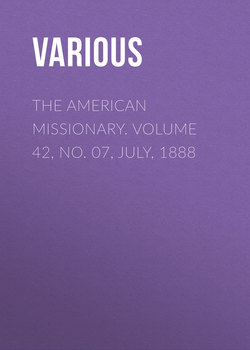Читать книгу The American Missionary. Volume 42, No. 07, July, 1888 - Various - Страница 5
MR. CABLE'S PAMPHLET
ОглавлениеA COLORED MAN'S VIEW OF IT
Mr. Cable's Pamphlet, "The Negro Question," was sent to an educated Christian colored man in the South. We make some brief extracts from his letter acknowledging the receipt of the pamphlet. He says:
I have read "The Negro Question," by Geo. W. Cable, and appreciate it highly. It is the ablest treatment of the subject intellectually, morally and judicially that I ever saw. Mr. Cable has dealt with that great question with the insight of a statesman and a thinker, and the candor of a true Christian. Oh, how I am vexed and do smart when I think of the wicked treatment I and my people are subjected to on account of the God-given color, and by a people claiming and professing to be Christians! I can hardly believe that any other people ever bore the names freemen and citizens, and at the same time were shut out from so many of their rights and liberties as we are. Our manhood is outraged, our civil and political rights are abused, our women are robbed of their womanhood and their chastity is insulted, our aspirations are banded and proscription is held up to our eyes wherever we go, and enforced against us with Egyptian exactness and Spartan severity, and the most vexatious and grievous fact of all is, that the strong arm of the law of the land loses its power when it comes our turn to receive justice. The law either plays truant, or openly acknowledges that it has no power to defend us. But the God of law and justice, who broke down one form of slavery, will break down this, too. Still, there is a part for us to do. On this line, as on others, the man who needs help must help himself while he asks for help.
MRS. WARE
We honor the memory of the early and self-denying workers among the Freedmen. They were ostracised at the South, and were scarcely appreciated at the North. Many of them have laid down their lives in the service, others were compelled to return home on account of ill-health, but others still are toiling on, seeing the fruits of their labors in the new impulse given to the Negro in his great race struggle. Among the earliest and most efficient of these workers was President Ware, of Atlanta, now gone to his reward. Mrs. Ware is still at the post of duty, and, though in feeble health, clings with undiminished interest to her chosen life-work.
At the recent anniversary of the Atlanta University, the meeting of the Alumni, (May 28th), was made pleasant and memorable by the presentation to Mrs. Ware of a large portrait of herself. It was wholly unexpected to her, and her impromptu acknowledgment of the gift was made in the vein of her characteristic vivacity and kindness. Among the addresses made at the presentation, was one by Mrs. Chase, herself one of our earliest and most honored laborers. From this address we are permitted to make a few extracts.
It is very significant that at any time during these twenty years of your life here, it would have been just as delightful to meet and say the pleasant words that leap to our lips, as it is to say them to-day. You, whom we delight to honor this afternoon, have held the same post of honor all these years, but many of us do not know how delightfully you hold that place, so I, who have known you so long, am asked to explain, and if this hasty sketch seems too flattering to be given in your presence, I fear you alone are responsible. If you had put less into your life for us to admire, we could put less into our expression of admiration.
We know how you lost early a good mother, and that your father was taken when you were only eighteen; but the missionary spirit of that father was repeated in the daughter. We know of your being discouraged by a missionary Board because applying so young, but of your being finally accepted, and going to Hampton, reaching that now famous school even before the veteran—General Armstrong.
Then came the year of teaching at Charleston, a year so full of privations in those pioneer days, that though repeated calls came to you from Florida and Georgia, as well as the old fields, you shrank from farther hardships and decided to remain at home, till one Sunday morning in Connecticut, twenty years ago, these words were unfolded in a sermon, "Simon, Son of Jonas, lovest thou me? Yea, Lord, thou knowest that I love thee. He saith unto him, Feed my Lambs." How easy it is for us now to see the beautiful Providence of those wonderful words finding a swift response in your heart and bringing you at once to Atlanta. There are those before me now that greeted you then in Storrs School. How much we might say of that eventful year when you worked beyond your strength to fit the "A" class for Atlanta University. We can hardly see how it could have been otherwise than that the next year you should come to us, the bride of our beloved President. But position brought no exemption from hard work to either of you royal workers.
We shall never forget what hosts of friends have been won for the school by your ready pen and stirring words. And during those sixteen memorable foundation years of our school, which are so rapidly passing into history, who can ever know how much of their grand success was due to you for your devotion to him who created Atlanta University, and made it what it is? We may know in that "day when He makes up his jewels."
